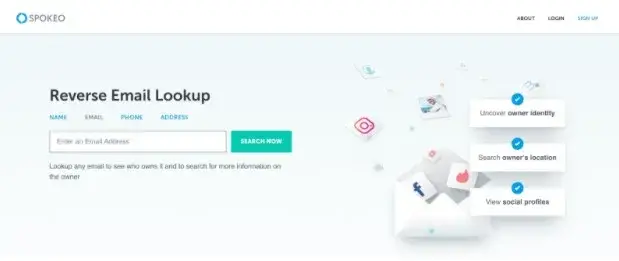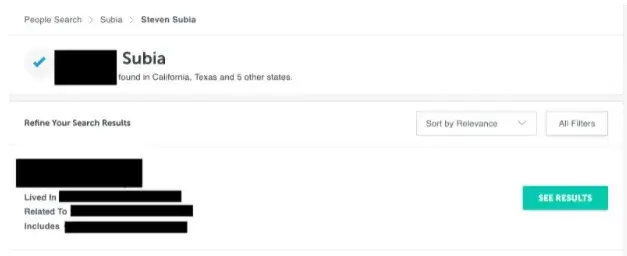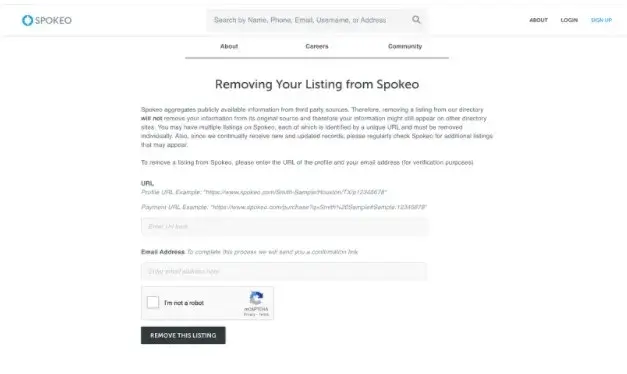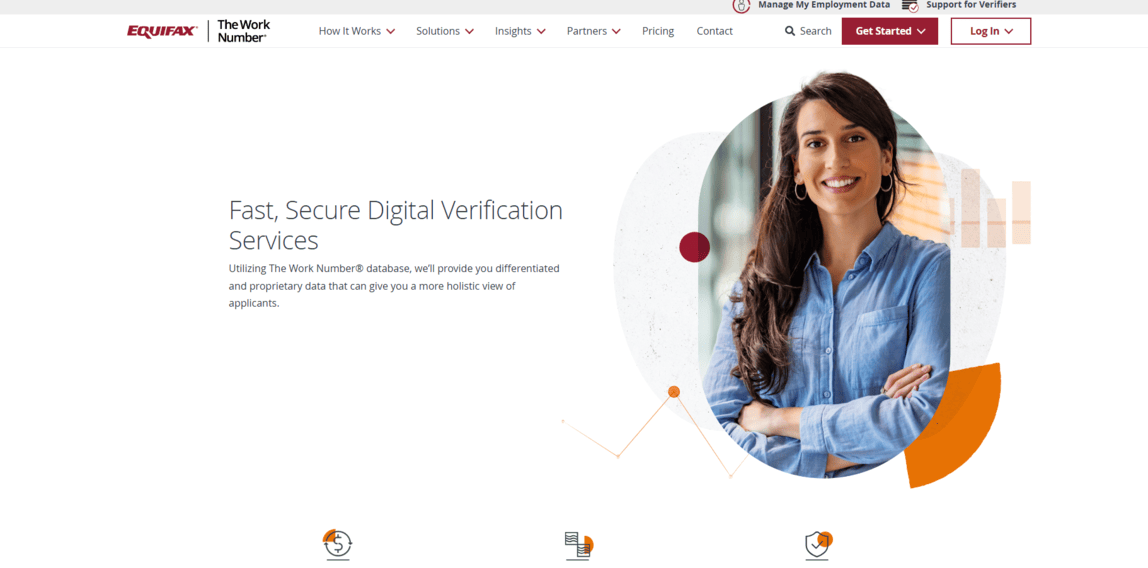How to Complete a Spokeo Removal Request
Julianne Subia
Reading time: 11 minutes

Table of Contents
Spokeo is a data broker website that collects personal identifiable information (PII) on hundreds of millions of people. The company is legally able to do this as it collects data from public sources, such as public records and social media profiles.
It then sells this data onto third parties, who will often use it for marketing purposes. Problems can often occur when your personal data acquired from a data broker falls into the wrong hands and you then start receiving spam, scam, and robocalls and spam and scam texts.
Therefore, to protect your identity and to cut down on the amount of nuisance calls and potential scams you’re exposed to, it’s best to regularly remove your personal data from data brokers such as Spokeo.
DeleteMe’s Spokeo Opt Out Review
You can complete a Spokeo opt-out request by completing an online form and verifying your email address. Once submitted, your listing should be removed within 72 hours.
| Speed: 4 | Difficulty: 1 |
|---|---|
 |
 |
Step-by-Step Spokeo Removal Guide

1. Search for your personal data on spokeo.com.
2. Find your listing and click on it to see your profile.

3. Copy the URL (web page address) of your profile page.

4. Go to Spokeo’s opt-out page, spokeo.com/optout, and paste the URL of your listing, enter an email (we recommend using a masked email), and perform the CAPTCHA.

5. Click the verification link in the email that’s sent to you.

6. You will be redirected to a final confirmation page.

What Happens Next?
When you remove personal data from Spokeo, you’re essentially preventing other people from accessing your information. In the case that you’ve been subjected to cyberstalking, removing records from Spokeo’s databases will reduce a stalker’s chance of finding more information about you. Likewise, identity thieves will find it tougher to steal your digital persona by removing your data from this type of platform.
Who Else Is Selling Your Info?
You’ve completed your Spokeo opt-out, but Spokeo is just one of the many people search sites and data brokers selling your personal information online. Learn more about people search sites and data brokers in our data broker guide.
Check out our data broker opt-out guide for a list of other data brokers you should remove your personal data from, including:
- How to remove yourself from Whitepages.
- How to remove yourself from BeenVerified.
- How to remove yourself from Whitepages.
- How to remove yourself from PeopleFinder.
- How to remove yourself from Radaris.
- How to remove yourself from People Background Check.
- How to remove yourself from TruthFinder.
- How to remove yourself from MyLife.
- How to remove yourself from Intelius.
- How to remove yourself from Fast People Search
- How to remove yourself from Arrests.org.
- How to remove yourself from CheckPeople.com
- How to remove yourself from Instant Checkmate.
Alternatively, subscribe to a data broker removal service such as DeleteMe. Our privacy experts will remove your personal data from these sites on a regular basis to ensure your digital footprint is kept to a minimum.
Spokeo Opt Out FAQs
Here are some common questions that people have about Spokeo.
What is Spokeo?
Spokeo is a people search website that lets you search for people by name, email, phone number, home address, or username.
According to Spokeo, the site has 6 billion consumer records. Spokeo personal information reports can include contact details, location history, social media accounts, criminal records, and wealth data.
What is Spokeo used for?
Individuals can use Spokeo to look up friends, family, acquaintances, old classmates, online sellers, neighbors, dates, and unknown numbers.
However, Spokeo can also be used by bad actors for harmful activities and behaviors, including harassment, doxxing, cyberstalking, stalking, scams, identity theft, and guessing online account login details.
Businesses can use Spokeo to find relatives (for example, in healthcare), locate parties (legal cases), generate leads (real estate), skip tracing (debt collection), contact donors (non-profit), and prevent fraud (e-commerce).
At the same time, people search sites like Spokeo can also be used by companies to target you with more personalized ads, insurers to raise insurance premiums, and employers or landlords to determine your suitability for a job/accommodation.
While Spokeo warns on its site that it’s not a consumer reporting agency and, therefore, the information it provides can’t be used for making decisions about employment, tenant screening, or credit, the reality is that people search sites don’t usually vet their customers.
Does Spokeo show dating profiles?
Yes, Spokeo shows dating profiles from sites like Tinder and OkCupid. Spokeo has a dedicated landing page where you can enter someone’s name or email address and find their dating profile.
According to Spokeo, they will check 120+ social and dating sites to see if there’s a match.
On the same landing page where you can find out if someone has a dating profile, you can also “find out who they’re texting behind your back” by entering the “cheater’s number” in Spokeo’s reverse phone number search bar.
What does Spokeo show you?
A typical Spokeo report shows you the following information:
- Contact information. Names, aliases, phone numbers, and email addresses.
- Location history. Current address, past addresses, residents, and neighbors.
- Family and associates. Family members, household demographics, birth records, and marriage records.
- Social media accounts. Social media, usernames, dating sites, and gaming and music accounts.
- Personal details. Birth information, marital status, education level, and hobbies and interests.
- Wealth data. Property owned, lifestyle data, investments, and estimated salary.
- Criminal records. Criminal records, DUIs, and sex offenses.
Spokeo can also notify you when a person’s report is updated with new personal information.
Having your personal information exposed online and available to anyone willing to pay $1 for it can put you at risk of harassment, stalking, doxxing, identity theft, scams, and other malicious or criminal behaviors.
How did Spokeo get my information?
Spokeo gets your information from various sources, including but not limited to public records, public social media accounts, surveys, and mailing lists.
Why does Spokeo have my information?
Spokeo has your information because it is publicly available elsewhere. Spokeo is a personal information aggregator that compiles personal data from sources like public records and public social media profiles into comprehensive accounts.
Is Spokeo legit?
Spokeo is legit in that it actually provides personal information about individuals. However, the accuracy of this data can vary.
Is Spokeo free?
No, Spokeo is not free. You must pay a monthly fee to see someone’s personal information. That said, you can usually get a 7-day trial and pay less than $1 for a personal information report.
Is Spokeo accurate?
Not always. Spokeo says, “It is possible in some cases that outdated or incorrect information can be incorporated into a report along with up-to-date, correct information.”
In the past, Spokeo was fined for marketing people’s data to recruiters and employers without making sure the data it sold was accurate (as well as for not verifying who the buyers were and why they bought the data and for not notifying the person whom the information belonged to).
Spokeo was also taken to court by a man who said that Spokeo had inaccurate information about him, which caused him to lose out on job opportunities.
In general, about 40% of data that people search sites and data brokers have on individuals is inaccurate or no longer accurate.
Inaccurate information on people search sites and data brokers can have many negative consequences, including higher insurance premiums, denial of rental applications, lost job opportunities, and wrongful arrests.
Is Spokeo legal?
Spokeo’s business model – collecting and selling people’s personal information – is legal. This is because Spokeo mostly gathers data already in the public domain.
There are currently no laws in the US at the federal level that would regulate data brokers. That said, some states are putting in place their own laws, making it easier for consumers to remove their information from data brokers.
Does Spokeo work?
Spokeo works in the sense that it provides personal information about people. However, not all of the data it has may be correct.
Is Spokeo dangerous?
Yes, Spokeo is dangerous. The reason why is that Spokeo (and other people search sites and data brokers) exposes your personal information on the internet.
Anyone can see this information, including your full address, marital status, and location history, for a small fee (and in the case of some other people search sites, for free).
Since Spokeo doesn’t vet its customers, your personal data could end up in the hands of bad actors who may use it for harassment, doxxing, stalking, identity theft, scams, and other criminal purposes.
Is Spokeo a scam?
Spokeo is not a scam in that it does what it says: It sells people’s personal information to those willing to pay for it. Not all of the information it provides might be correct, but that’s the case with all people search sites and data brokers.
Does Spokeo post info on minors?
Spokeo says that it does now knowingly post information on minors but acknowledges that it can be difficult to distinguish who is a minor and who isn’t on the internet.
Does Spokeo work for cell phone numbers?
Yes. Spokeo’s reverse phone number lookup tool lets you search for people both by their cell phone and landline numbers.
Does Spokeo notify the person you’re looking up?
No. Spokeo does not notify the person you’re looking up. All searches on Spokeo are confidential.
How do I contact Spokeo?
You can contact Spokeo by calling them at 1 (888) 558-9004 between 5 am and 8 pm PT daily. You can also email Spokeo at CustomerCare@spokeo.com or chat with their virtual assistant through their contact page: https://www.spokeo.com/contact.
If you want to remove your personal information from Spokeo, you can fill out Spokeo’s opt-out form. You can follow our Spokeo opt-out guide for clear, step-by-step instructions on how to do so.
Do I need to remove myself from Spokeo?
Yes. Anyone can find your personal information on Spokeo, from friends and family members to stalkers and criminals.
If you care about your online privacy and want to reduce the risk of malicious acts like harassment, doxxing, stalking, identity theft, and scam emails and texts, you need to remove yourself from Spokeo.
To do so, follow our step-by-step Spokeo opt-out guide.
Can you delete yourself from Spokeo?
Yes, you can delete yourself from Spokeo. To do that, you must first find your Spokeo profile and complete a Spokeo opt-out form. Follow our Spokeo opt-out guide for clear instructions.
How to remove info from Spokeo?
To remove your personal information from Spokeo, you’ll need to first find your profile on the Spokeo site and copy the URL. Then, complete the Spokeo opt-out form and verify your opt-out request via email. Your personal data should be removed from Spokeo within 72 hours.
Our privacy advisors:
- Continuously find and remove your sensitive data online
- Stop companies from selling your data – all year long
- Have removed 35M+ records
of personal data from the web
Save 10% on any individual and
family privacy plan
with code: BLOG10
news?
Don’t have the time?
DeleteMe is our premium privacy service that removes you from more than 750 data brokers like Whitepages, Spokeo, BeenVerified, plus many more.
Save 10% on DeleteMe when you use the code BLOG10.

















